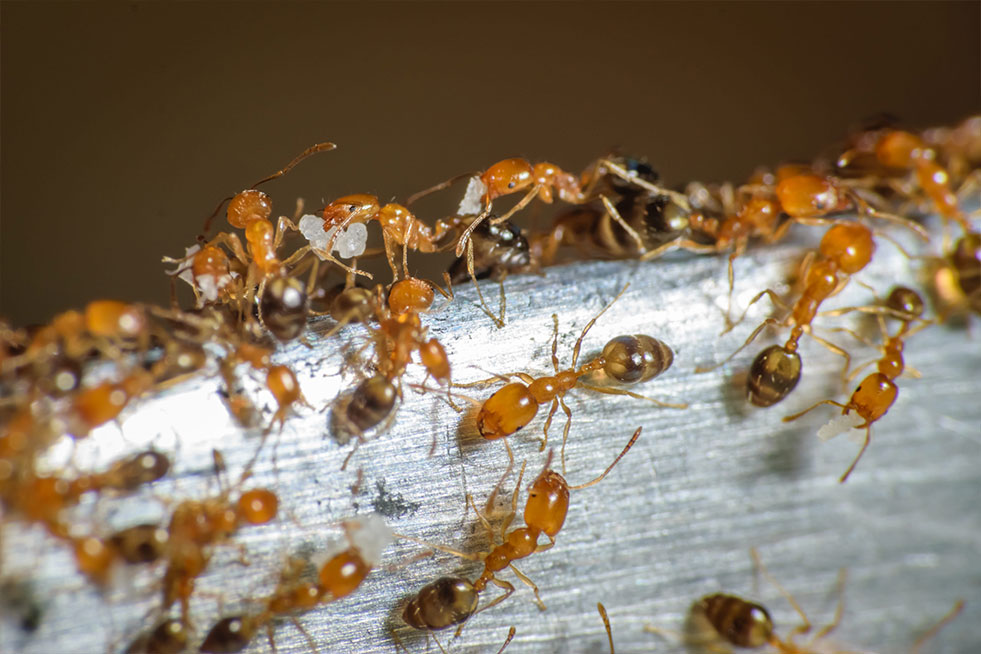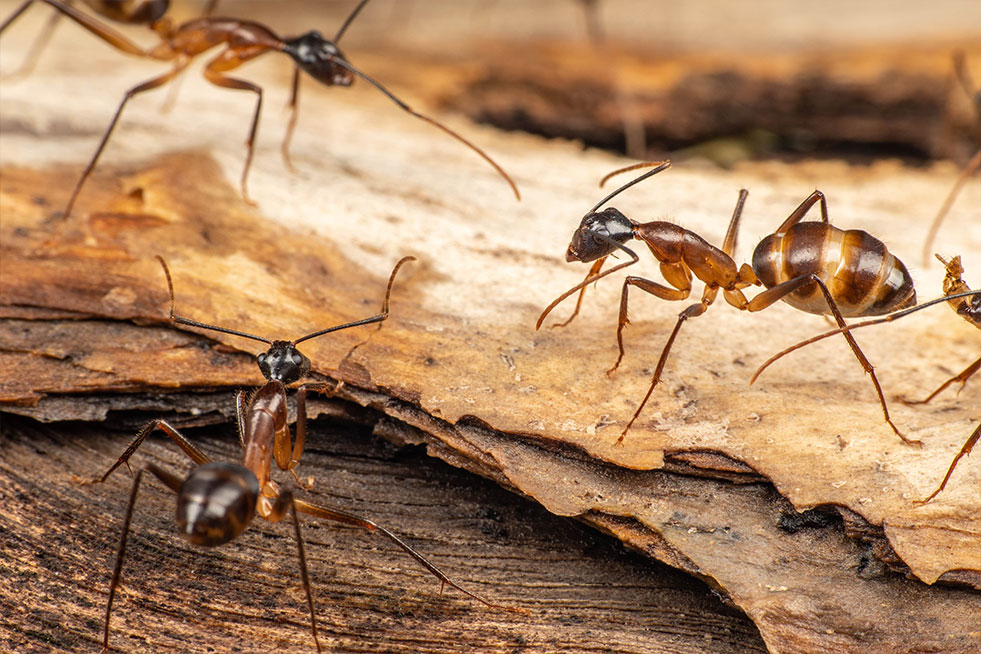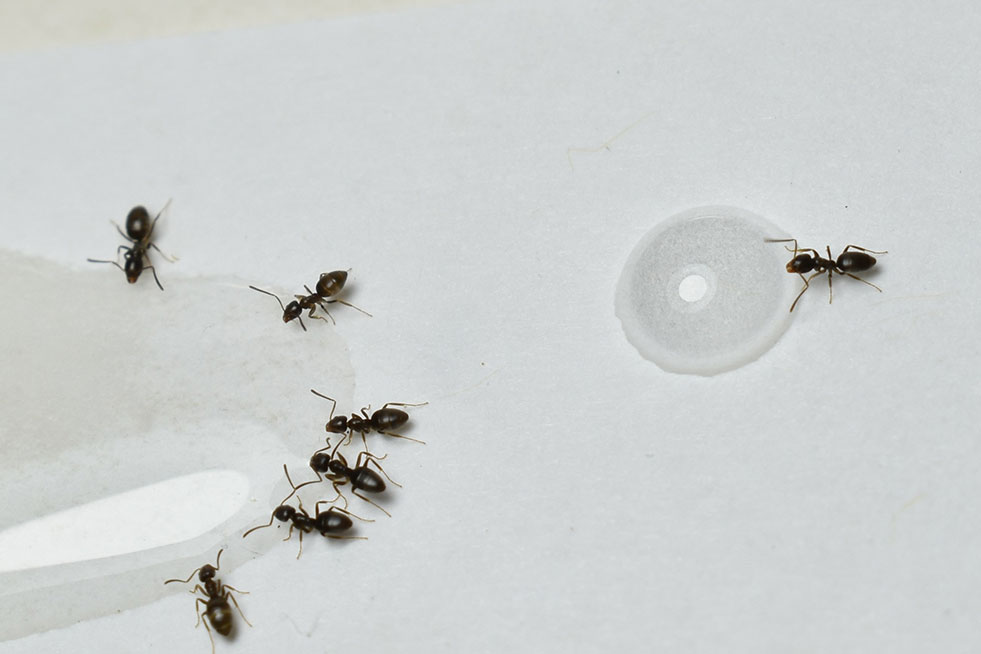Ants are everywhere in many forms. They’re in your home and garden, some can damage your home and lawn, and others can bite or sting. Whatever species of ant has invaded your home, it’s essential to act quickly with a pest management professional before things get out of control.
Poulin’s Pest Control offers fast, effective ant control for your home or business in Edmonton. Our experts will visit your property, assess the situation, and recommend the best ant removal treatment. Contact us today to schedule your service call.

Ant control methods in Edmonton
There are three effective treatment options for ant removal: spraying, bait, and dusting
The experts at Poulin’s Pest Control know these three pest management methods thoroughly and can advise on the best places to spray, place gel baits, and apply the dust. They can also come to your home or business and take care of the whole process for you.
Common ant types in the Edmonton area
Many ant varieties live in the Edmonton area. Here are some of the most common.

Carpenter ant
The carpenter ant is one of the most destructive ants. This pest builds nests by burrowing tunnels into wood, causing significant structural damage to homes and buildings. Carpenter ants often live in colonies with many nest sites over a large area and may have thousands of workers.
Field/mound-dwelling ant
The field ant is one of the most visible types of ants in the Edmonton area. You’ll find them near sidewalks, parks, and buildings. Their nests are large dirt mounds that can damage lawns and gardens. Field ants come in several species with different sizes. They hunt bugs to eat and farm aphids for the honeydew they excrete.
Odorous house ant
The odorous house ant will nest in a variety of moist places, including inside homes near leaks or rotten wood. They can have extremely large colonies with multiple queens. When the ant is crushed, they smell like rotting coconut or blue cheese. This ant loves sweet foods.
Pharaoh ant
The pharaoh ant is one of the most difficult ants to eradicate because of their tiny size, tendency to get into small cracks, large colony size of potentially hundreds of thousands, and habit of budding into new colonies. They are a yellowish colour, often with a darker abdomen and are typically only 1-2 millimetres long. They are easily confused with thief ants (one way to tell them apart is that pharaoh ants have a three-segmented antennal club and thief ants have a two-segmented club). These ants love moist warm areas and will nest in tiny spaces such as between sinks and counters, under baseboards, in appliances, or walls. The Pharoah ant eats sweet foods, fatty foods, bugs, and meat, which can be a health problem for businesses that handle, prepare, and serve food.
Pavement ant
The pavement ant builds nests under sidewalks, patio blocks, driveways, and next to concrete buildings, leaving mounds of dirt on top of the pavement. Pavement ants can invade a home in search of food. Large groups can infest a kitchen or patio and become a nuisance. Sealing cracks and crevices on the exterior foundation and walls can help to keep them out, along with residual sprays applied to the exterior during warmer months.
Ant Control in Edmonton and the surrounding area
Poulin’s Pest Control can help you manage your ant problem by finding their nests and food sources and recommending proven effective pest control methods. You can trust us to deliver effective pest control solutions for your home or business. Contact us today to book a service call with an ant removal expert.

Frequently asked questions (FAQs)
Here are some answers to frequently asked questions about ant control.
Q. What should I do to prevent an infestation?
A. Remove or seal all potential food sources. Fix plumbing leaks and seal cracks in the foundation, windows and door facings. Eliminate damp spots and rotten wood. Set gel baits at strategic locations throughout the house.
Q. What will permanently get rid of ants?
A. The most effective method of permanently getting rid of ants is to call a professional pest control company. Pest control technicians have the knowledge and the equipment to eliminate an infestation. They’ll also put measures in place to ensure the ants don’t return.
Q. How do I get rid of ants all over my house?
A. Diatomaceous earth, Borax (sodium tetraborate) and vinegar all work well to kill ants all over your house. However, ants live in colonies, and if you don’t kill the entire colony, they’ll keep returning.
Q. How do you find where ants are coming from?
A. Place some peanut butter and honey where you see ant activity. Wait until ants start feeding and trailing to and from the food. Follow the trail of ants to their nest or where they’re accessing your home.
Q. Why do ants suddenly appear?
A. An ant infestation can come out of nowhere. Here are some common causes:
Q. Does killing ants attract more?
A. Dead ants attract more ants because when an ant dies, it releases pheromones telling others there’s danger in the area. Ants will then visit the place to investigate the threat and carry the dead body away to a midden — or ant cemetery.
Q. Do ants serve any good purpose?
A. Ant tunnels aerate and fertilize the soil, allowing oxygen, nutrients and water to reach plant roots. Ants are also an essential food source for other birds and animals.
Q. What naturally makes ants go away?
A. Salt, baby powder, lemon juice, chalk, vinegar, bay leaves, cinnamon, black pepper or peppermint oil are a few things that ants hate. Emptying coffee grounds on ant nests confuses their scent trails.
